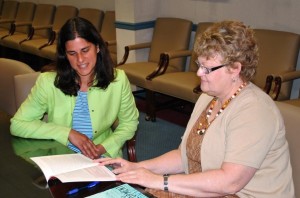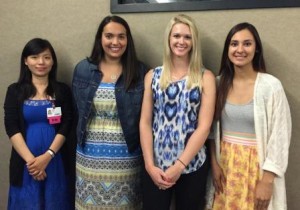Mentoring Boosts People Involved, and Nursing As a Whole

Maria Torchia LoGrippo (left) and Edna Cadmus review notes from LoGrippo’s leadership training held in June at the Center for Creative Leadership in North Carolina
If you ask a nurse manager, chief nursing officer, or a nurse leader how they got where they are, it’s likely they will mention mentors who helped along the way. It’s just as likely that the experience benefited both teacher and student—while contributing to a nursing culture that promotes and values leadership.
Just ask Maria Torchia LoGrippo how mentoring helps nurses learn and grow. As aNew Jersey Nursing Initiative scholar, LoGrippo was able to finance her doctorate in nursing at Seton Hall thanks to the Robert Wood Johnson Foundation (RWJF)—and found equally important help afterward in her mentor.
LoGrippo was guided in her postdoctoral position at Rutgers University by Edna Cadmus, who provided her protégé with opportunities to lead, including LoGrippo’s current position as project director for an RWJF State Implementation Program grant.
Cadmus, who is specialty director of the Nursing Leadership Program at Rutgers’ School of Nursing and co-lead of the New Jersey Action Coalition, has helped guide LoGrippo’s career trajectory, LoGrippo said, and was “the key” to her being hired by Rutgers as an assistant professor. Now LoGrippo has been asked to direct the RN-to-BSN program at Rutgers—another role that LoGrippo attributed to Cadmus’ ongoing conversations, advice, and counsel.
The Institute of Medicine’s landmark 2010 report on the future of nursing cites mentoring as a good way to strengthen the workforce and improve the quality of care and patient outcomes. That’s why mentoring is one strategy the Future of Nursing: Campaign for Action, a joint initiative of RWJF and AARP, is implementing through its 51 state Action Coalitions.

Amy McCarthy, a charge nurse at Texas Health Presbyterian Dallas, receives mentor support from Cole Edmonson, the hospital’s chief nursing officer and co-lead of the Texas Team.
“Mentoring is really a bidirectional relationship,” said Cole Edmonson, chief nursing officer at Texas Health Presbyterian Hospital Dallas, and an RWJF Executive Nurse Fellow. Edmonson mentors Amy McCarthy, a charge nurse at the hospital. When McCarthy met Edmonson, she said right away: “I want your job, now how do I get it?” Edmonson has been showing her the ropes since.
Thanks to Edmonson’s selecting McCarthy as the new nurse representative on the National League of Nursing Accelerating to Practice Advisory Board, said McCarthy, she’s been exposed to people and ideas at the national level in a way that wouldn’t have been possible otherwise. McCarthy has relied on Edmonson on matters large and small: “He connects me with people interested in what I need to know. He has been a constant source of support.”
“Mentors help us through the difficult times, celebrate our accomplishments, and guide us through decisions and difficult situations,” said Edmonson, who has benefited from the efforts of several nursing mentors over his career.
Like many other RWJF Executive Nurse Fellows, Edmonson is using his leadership skills to mentor younger nurses; he also leads an Action Coalition—in his case, the Texas Team.

Nursing students HuiHui Sun, Carley Bruscato, Natalie Dumont, and Raquel Torres are part of the Arkansas Action Coalition Young Leaders program, which provides them with mentoring, networking, and leadership development opportunities.
Several state Action Coalitions, including those in Arkansas and Vermont, use mentoring to help prepare nurses to lead change. In Vermont, nurse leaders were encouraged to find a mentor; in Arkansas, the Action Coalition creates the pairings.
“Mentoring is particularly important for nurses who want to advance into positions of leadership, including positions on boards,” noted Mary Val Palumbo, co-lead of the Vermont Action Coalition and a University of Vermont associate professor of nursing.
Nurses completing the coalition’s yearlong Vermont Nurse Leaders Fellowship Program were encouraged to identify and seek out mentors. Palumbo credits her mentor, University of Vermont Professor of Health Policy and Nursing Betty Rambur, with helping her “set new goals, strive for excellence, and be willing to step up to the plate.”
In Arkansas, the Action Coalition made sure that mentoring was part of its Young Leaders Program, designed for nursing students earning their bachelor’s degrees. The program pairs participating students with experienced nurses; students then complete nurse leadership projects under the guidance of their mentors, who help them hone leadership skills.
“Each of the youth leaders is having a unique experience outside of traditional bedside nursing,” said Erin Fifer, coordinator for the Arkansas Action Coalition. “The mentoring and networking opportunities each student receives will be invaluable to their nursing career.”
This story appeared in the July 2015 issue of Advancing Health: News from the Campaign for Action.
